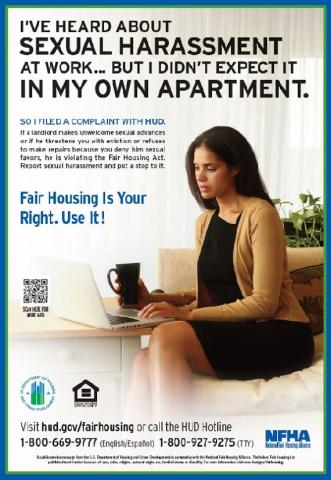
New housing rule protects most vulnerable women from sexual harassment in their home
A home should be a refuge and a place of comfort. But for many women their landlords are a source of fear, demanding sexual favors along with rent money. This kind of sexual harassment isn’t often in the news cycle but it happens routinely, just below the radar, and it’s one of the subjects of a new rule from the U.S. Department of Housing and Urban Development (HUD) to protect the most vulnerable women from predatory landlords or others.
Most of us know and have long recognized that the Fair Housing Act prohibits harassment in housing and housing-related transactions because of race, color, religion, sex, national origin, disability and familial status.
Yet HUD continues to see these kinds of cases. Recently in South Dakota, HUD charged landlords with sexual harassment because a property manager demanded sexual favors from the tenant who feared losing her housing if she rebuffed him. In another egregious case, landlords in West Virginia agreed to pay $120,000 in damages and civil penalties to settle allegations that three agents sexually harassed and retaliated against female tenants. HUD referred that case to the Department of Justice.
The unique vulnerability of poor women makes them targets of sexual harassment in their home. Immigrants, racial and ethnic minorities, single mothers, and persons with disabilities may also experience increased vulnerabilities. Housing providers may coerce women into sexual acts, threatening to put the woman and her children out on the street if they do not comply with their demands.
These actions are against the law. Even though these victims may know what happened is wrong, they may not know they have recourse. That is why HUD’s announcement of a proposed rule that would spell out the standards for assessing claims of harassment under the Fair Housing Act is so important.
HUD’s proposed rule, “Quid Pro Quo and Hostile Environment Harassment and Liability for Discriminatory Housing Practices under the Fair Housing Act,” would define and provide illustrations of two types of harassment claims: (1) quid pro quo harassment, and (2) hostile environment harassment.
Quid Pro Quo Harassment includes subjecting a person to an unwelcome request or demand and relating that to the person’s housing. For example, an employee of a homeless shelter might request sexual favors from female shelter residents as a condition of staying at the shelter, or a manager of rental properties conditions the rent amount on whether female tenants grant sexual favors.
Hostile Environment Harassment includes subjecting a person to unwelcome conduct that is sufficiently severe or pervasive such that it interferes with or deprives the person the right to use and enjoy their home. For example, the owner of a rental home enters a tenant’s unit and makes unwelcome sexual advances, or if a landlord allows harassment of a tenant with disabilities, as in a recent Wisconsin case for which HUD charged Wisconsin landlords. Race- and national origin-based harassment is also covered, including, for example, neighbors who create a hostile environment for an African-American family that moves into the neighborhood.
Absent any standards set by HUD, courts have often applied employment discrimination standards first adopted under Title VII to evaluate claims of harassment under the Fair Housing Act. But given the differences between harassment in the workplace and harassment in one’s home, these workplace standards are not always the most suitable.
When harassment happens in the workplace, the victim can escape to his home. In contrast, when harassment happens at home, the victim has no escape short of moving or staying away from the home – neither of which should be required.
This rule is simple: no one should be subject to harassment and especially not in your house, which should be your sanctuary. Please contact HUD if any of these examples sound familiar, or file a fair housing complaint based on harassment: (800) 669-9777.
We are here to help.



The views and opinions expressed in this post are those of the author(s) and do not necessarily reflect those of MomsRising.org.
MomsRising.org strongly encourages our readers to post comments in response to blog posts. We value diversity of opinions and perspectives. Our goals for this space are to be educational, thought-provoking, and respectful. So we actively moderate comments and we reserve the right to edit or remove comments that undermine these goals. Thanks!